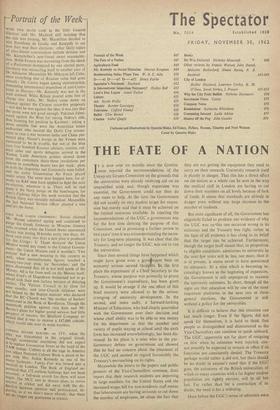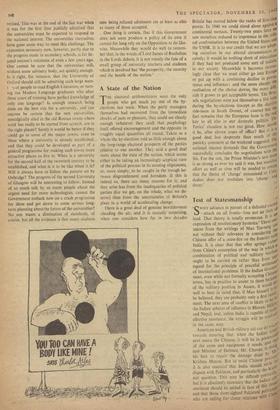THE FATE OF A NATION
TT is now over six months since the Govern- ' ment rejected the recommendations of the University Grants Committee on the grounds that the universities were already receiving aid on an unqualified scale and, though expansion was essential, the Government could not then do any more to help. At the time the Government did not modify its very modest target for expan- sion but merely said that it must be achieved on the limited resources available. In rejecting the recommendations of the UGC a government was for the first time denying the purpose of that Committee, and in promising a further review in two years' time it was misunderstanding the neces- sity for long-term planning. It was clear that the Treasury, and no longer the UGC, was out to run the universities.
Since then several things have happened which t might have given even a gove nient bent on economy serious second thong ts. In the first place the experiment of a Chief Secretary to the Treasury, whose purpose was primarily to prune the Government's expenditure, has been given up. It would be strange if the one effect of this brief ministry were allowed to be the serious cramping of university development. In the second, and more sadly, a forward-looking Minister of Education, who had clearly quarrelled with the Government over their decision and whose chief ability was to be able to win money for his department so that the number and variety of pupils staying at school until the sixth form has increased overwhelmingly, has been dis- missed. In his place is a man who in the par- liamentary debate on government aid showed that he had no concern about the treatment of the UGC and seemed to regard favourably the Treasury's encroaching on its rights.
Meanwhile the letters to the papers and public protests of the Vice-Chancellors continue, dons report that their research students are departing in large numbers for the United States and the increased wages bill for non-academic staff means that laboratories are having seriously to cut down the number of employees, let alone the fact that
they are not getting the equipment they need to carry on their research. University research itself is plainly in danger. That this has a direct effect on the nation as a whole can be seen in the way the medical staff in London are having to cut down their numbers on all levels because of lack of funds. It seems that standards are already in danger even without any large increase in the number of students.
But most significant of all, the Government has singularly failed to produce any evidence of why the UGC was on -this one occasion wrong in its estimates and the Treasury was right; rather in the face of all evidence it has clung to its belief that the target can be achieved. Furthermore, though the target itself means that, in proportion to eligible candidates, admissions to university in the next few years will be less, not more, than it is at present, it seems never to have questioned its adequacy. At a time which is becoming in- creasingly known as the beginning of expansion, the Government is still unprepared to reassess the university estimates. In short, though all the signs are that education will be one of the most important platforms in the next two or three general elections, the Government is still without a policy for the universities.
It is difficult to believe that this situation can last much longer. Even if the figures did not speak for themselves, it is hard to think that people as distinguished and disinterested as the Vice-Chancellors can continue to speak unheard. The UGC, apparently not far short of resigning en bloc when its estimates were rejected, can- not possibly be expected to remain in office if its functions are consistently denied. The Treasury perhaps would rather it did not, but there should be no doubt in anyone's mind that if the UGC goes, the autonomy of the British universities, of which so many countries with a far higher student population are rightly envious, will be all but lost. Far rather than for a contraction of its duties, the need is for a widening.
Once before the UGC's terms of reference were
revised. This was at the end of the last war when it was for the first time publicly admitted that the universities must be expected to respond to the national interest. The universities themselves have gone some way to meet this challenge. The expansion necessary now, however, partly due to the progress made in secondary schools, is far be- yond anyone's estimates of even a few years ago, One cannot be sure that the universities will, without some advisory body, act quickly enough. Is it right, for instance, that the University of Oxford should still be admitting such large num- I .s of people to read English Literature, or turn- ing out Modern Language graduates who after three years of training have perfect knowledge of only one language? Is enough research being done on the best size for a university. and can anyone be certain that the new universities, nostalgically sited in the old Roman towns where work has really to be started from scratch. are in the right places? Surely it would be better if they could go to some of the major towns. even to those where a university is already established, and that they could be developed as part of a general programme for making such towns more attractive places to live in. When is a university for the second half of the twentieth century to be established, and what is it to be like when it is? Will it always have to follow the pattern set by Oxbridge? The progress of the second University of Glasgow will be interesting to follow. Instead of so much talk by so many people about the urgent need for more technologists, cannot the Government embark now on a crash programme for these and get down to some serious long- term planning about the future of the universities? No one wants a diminution of standards, of course, but all the evidence is that many students now being refused admission are at least as able as many of those accepted.
One thing is certain, that if this Government does not soon produce a policy of its own it cannot for long rely on the Opposition to do like- wise. Meanwhile they would do well to remem- ber that, in the words of Lord James of Rusholme in the Lords debate, it is not merely the fate of a small group of university teachers and students which is involved but 'the prosperity, the security and the health of the nation.'







































 Previous page
Previous page